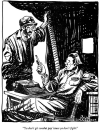2-Bit Speed
Pattern Altitude
- Joined
- Nov 9, 2021
- Messages
- 1,553
- Display Name
Display name:
2-Bit Speed
At least since the industrial revolution, military service has not been synonymous with combat service. There have always been rear-echelon troops who were not intended to see combat, but whose contributions were yet vital to the success of the frontline troops in combat. An AWACS pilot is an aviator and is in the military, thus I can see no argument against the eligibility of an AWACS pilot for a Military Aviator award.
The point of contention in this thread has been with the term Aviator, not Marine.
As I expressed in post 52, up until this point, aviators have always been understood as having to face the dangers associated with air travel at a minimum. This would be the first time an RC pilot was considered an aviator. I fly RC aircraft, am I an aviator based on that?
I haven't seen anyone in this thread claim that these servicemen shouldn't be recognized for their contributions, just that there are probably more appropriate awards or that more appropriate awards should be created.
The point of contention in this thread has been with the term Aviator, not Marine.
As I expressed in post 52, up until this point, aviators have always been understood as having to face the dangers associated with air travel at a minimum. This would be the first time an RC pilot was considered an aviator. I fly RC aircraft, am I an aviator based on that?
I haven't seen anyone in this thread claim that these servicemen shouldn't be recognized for their contributions, just that there are probably more appropriate awards or that more appropriate awards should be created.

